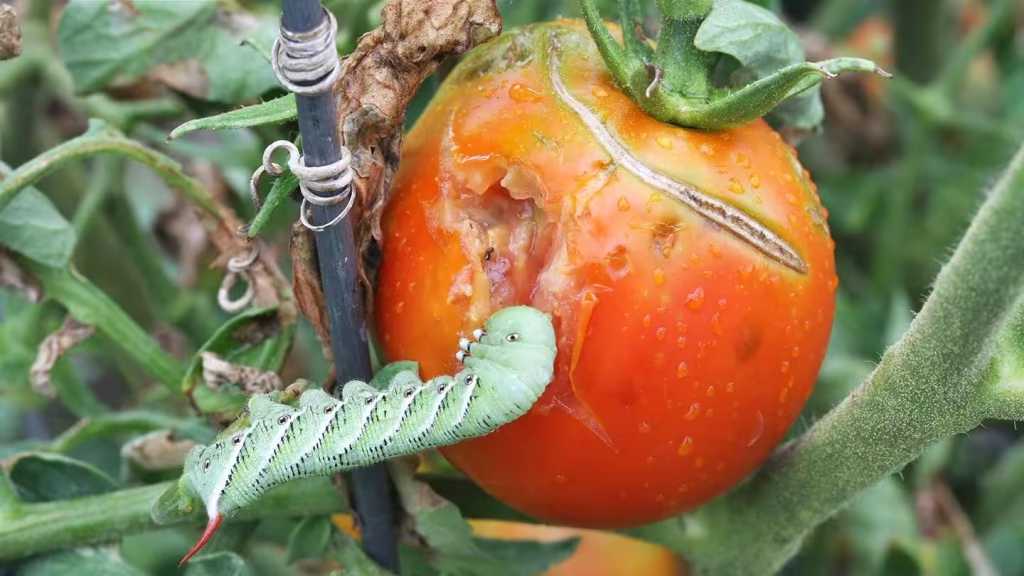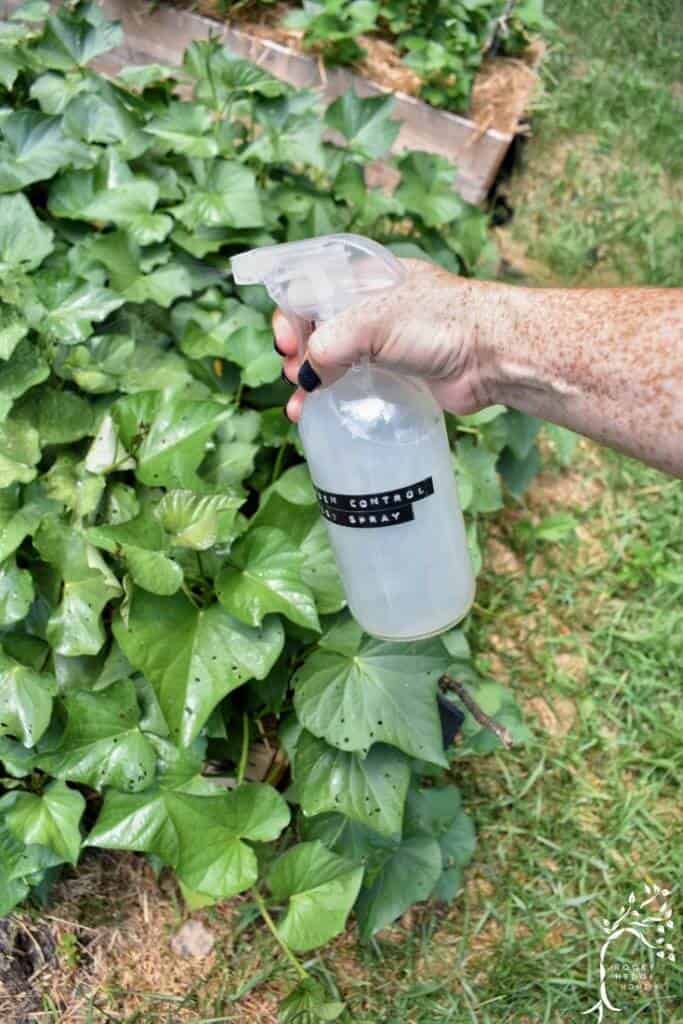Call us: +306949885346
How to Keep Bugs Off Your Plants Naturally | Organic Garden Pest Spray Recipes

If you’ve ever walked out to your garden excited to harvest a juicy tomato or crispy cucumber, only to find it half-eaten or riddled with holes—you’re not alone.
Bugs, beetles, aphids, and other small garden pests can quickly undo weeks of careful tending. But before reaching for harsh chemicals, there’s good news: you can fight back naturally — without harming your plants, the soil, or your health.
In this complete guide, you’ll learn how to protect your vegetable garden using safe, effective, and affordable methods — with homemade organic pest spray recipes, prevention tips, companion planting strategies, and more.
🌿 Why Go Organic for Pest Control?

Organic gardening isn’t just a trend — it’s a way to grow food that’s safe, healthy, and sustainable. Here’s why natural pest control is better:
- ✔️ Safe for kids, pets, and pollinators
- 🌼 Preserves soil health and beneficial insects
- 💸 Cost-effective (most ingredients are already in your kitchen)
- 🍅 Keeps your veggies truly chemical-free
🐛 Common Garden Pests That Target Vegetables

Before tackling them, it helps to know what you’re dealing with. Here are some usual suspects:
| Pest | What They Target | Damage Signs |
|---|---|---|
| Aphids | Tomatoes, peppers, cucumbers | Sticky leaves, curling edges |
| Cabbage worms | Leafy greens, broccoli | Holes in leaves |
| Slugs & snails | Lettuce, strawberries | Mucus trails, large holes |
| Squash bugs | Zucchini, pumpkins | Yellowing leaves, wilting |
| Cutworms | Young seedlings | Stems cut at soil level |
| Spider mites | Tomatoes, eggplants | Speckled yellow leaves |
🌿 1. DIY Organic Bug Spray Recipes (That Actually Work)
These natural sprays can be made in minutes with simple household ingredients.
1. Neem Oil Spray
Neem oil is one of the most powerful natural pesticides. It kills bugs and interrupts their life cycles.
Ingredients:
- 1 tsp neem oil (cold-pressed, organic)
- 1/2 tsp mild liquid soap (like Castile)
- 1 quart warm water
Instructions:
- Mix ingredients in a spray bottle.
- Shake well and spray directly on affected leaves, under the leaves, and stems.
- Use in the evening to avoid burning leaves in sunlight.
📝 Best for: aphids, mites, whiteflies, caterpillars
2. Garlic & Chili Pepper Spray
This combo repels many pests with its strong scent and spicy properties.
Ingredients:
- 1 head of garlic
- 1 small hot pepper or 1 tsp cayenne
- 1 quart water
- 1 tsp mild liquid soap
Instructions:
- Blend garlic and pepper in water.
- Let it steep overnight, then strain.
- Add soap and pour into a spray bottle.
📝 Best for: beetles, leafhoppers, aphids, squirrels
3. Insecticidal Soap Spray
This is a simple and gentle way to kill soft-bodied insects on contact.
Ingredients:
- 1 tbsp liquid Castile soap
- 1 quart distilled water
Instructions:
- Mix in a spray bottle.
- Apply early morning or evening when temps are cooler.
📝 Best for: aphids, mites, thrips, mealybugs
4. Vinegar Spray (Mild Herbicide & Insect Repellent)
Vinegar can deter ants and other bugs but use sparingly to avoid damaging plants.
Ingredients:
- 1 part vinegar (white)
- 3 parts water
- A few drops of dish soap
📝 Avoid spraying directly on leaves. Use around garden borders or on weeds.
5. Baking Soda Fungus Spray
While not an insecticide, it helps fight off fungal issues that weaken plants.
Ingredients:
- 1 tbsp baking soda
- 1 tbsp vegetable oil
- 1 tbsp liquid soap
- 1 gallon water
📝 Use weekly as prevention or treatment for powdery mildew.
🧄 2. Companion Planting: Nature’s Built-In Pest Control
Certain plants naturally deter insects. Interplanting them with your veggies creates a living barrier.
| Repellent Plant | What It Helps Protect |
|---|---|
| Basil | Tomatoes (repels aphids, mosquitoes) |
| Marigolds | Almost everything (repels nematodes) |
| Nasturtiums | Squash, cucumbers (trap crop for aphids) |
| Mint | Cabbage family (repels ants, beetles) |
| Rosemary | Beans, carrots (repels carrot flies) |
| Garlic & chives | Lettuce, carrots (repels aphids, slugs) |
💡 Bonus tip: Plant flowers like calendula and alyssum to attract beneficial insects like ladybugs and lacewings that eat pests.
🛠 3. Physical Barriers That Work Wonders
Sometimes the simplest methods are the most effective:
- Row covers: Lightweight fabric placed over plants to prevent bugs from laying eggs.
- Netting or mesh: Stops birds, squirrels, and flying insects from damaging crops.
- Copper tape: Repels slugs and snails when wrapped around raised beds or containers.
- Collars around seedlings: Cardboard or plastic rings deter cutworms.
🪴 4. Garden Hygiene & Maintenance Tips
Pests love messy gardens. Keep yours tidy to reduce the chance of infestations:
- Remove dead leaves and weeds (they harbor pests).
- Don’t overcrowd plants — airflow reduces mold and insects.
- Rotate crops yearly to prevent recurring pests.
- Water early in the day to avoid creating a damp, nighttime haven for bugs.
🧲 5. Natural Animal Deterrents for Your Garden
Aside from insects, small animals like squirrels, rabbits, or even deer can destroy your crops. Here’s how to stop them:
- Cayenne pepper spray on leaves or around soil perimeter
- Motion-activated sprinklers (great for deer, raccoons)
- Scare devices: aluminum foil strips, fake owls, wind chimes
- Fence or chicken wire buried 6–8 inches deep to keep out digging animals
💡 Planting onions, garlic, or hot peppers around your garden edge may deter many animals with their strong scent.
🧪 6. What NOT to Do: Common Mistakes
Avoid these to keep your garden safe and thriving:
- ❌ Using too much essential oil — can burn leaves
- ❌ Spraying during midday sun — causes leaf scorch
- ❌ Not testing sprays on a small area first
- ❌ Using chemical pesticides alongside organic ones (kills good bugs too)
🌻 For Beginners: Getting Started With Organic Pest Control
If you’re new to gardening, start with these simple steps:
- Inspect your plants daily. Look under leaves and at soil level.
- Start with insecticidal soap spray — it’s gentle and effective.
- Add marigolds and basil to your beds for easy wins.
- Keep it consistent. Organic methods take time but are worth it.
📌 Tip: Take notes! Keep a garden journal of what worked, when you sprayed, and what pests appeared.
🌱 Final Thoughts: A Healthy Garden Starts with Balance
Organic pest control is all about working with nature, not against it. When you encourage beneficial insects, use natural sprays wisely, and plant mindfully, you create a thriving, productive vegetable garden that doesn’t need chemicals to succeed.
Start small. Try one or two spray recipes. Mix in companion planting. And most importantly — be patient. A little effort now will lead to a bountiful, bug-resistant garden season after season.
I’m Anastasios Moulios, co-founder of DIY Cozy Living. I enjoy finding creative, practical ways to make small spaces feel warm, stylish, and lived-in. I started this blog with Katerina to share real ideas that make a home feel a little more personal and a lot more comfortable.
